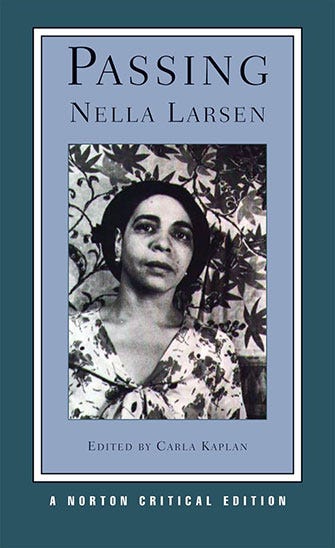 Photo: Courtesy of W.W. Norton & Company.
Photo: Courtesy of W.W. Norton & Company.I know you're all busy with the R29 Book Club, but I wanted to take a moment today to talk about another tome worth your attention over this long weekend. It's a short, easy, engaging read that also happens to be packed with significance that, as much as it is a revealing cultural study of the 1920s, is also incredibly relevant today.
I first read Passing for a class in college, and as much as I enjoyed it then, I felt compelled to pick it up as I walked by my bookshelf a few weeks ago. The second time around, the neat yet complex narrative and the simple honesty of its message were even more apparent to me. And, now, reading it on the subway on the way to a job that fully immerses me in the world of pop culture instead of in the quiet, safe bubble of liberal arts school, it's obvious that this book offers a pointed and uncomfortable critique on modern race relations.
AdvertisementADVERTISEMENT
The author, Nella Larsen, is a historical figure in her own right. She was the first African-American woman to receive a Guggenheim fellowship, and while her body of work is small, it's powerful. I won't spoil it for you, but basically, the book deals with the very different lives of two young, black women. One, Irene Redfield, is part of the Harlem elite, accomplished, reasonably wealthy, and sophisticated — but living in a cultural enclave. The other, Clare Kendry, is just as isolated but from her own race. Kendry, like a handful of her peers, is "passing" for white. Her husband doesn't know; in fact, he makes some very off-color jokes about her tan skin. This is as much a story about the gap between private and public selves as it is about racial identity, but what I find particularly interesting is the subtle commentary it offers on standards of beauty that, it seems, are just as ingrained now as they were back then.
"Whiteness" as the be-all and end-all of beauty takes on a very literal form in this book. Women like Clare Kendry struggle to maintain the lightest skin possible and emphasize certain features that suggest a European background. Today, whether due to political correctness or actual progress, it's much less blatant. Nobody would ever get away without saying, outright, that a black woman was too dark to be beautiful or famous. And, yet, there's a constant stream of controversies involving black actors' skin being lightened for magazine covers. Conversely, there's a reaction to that tendency that judges women like Beyoncé or Kerry Washington, who are relatively light-skinned and who don't generally wear their hair in its natural state. It's an understandable impulse, even if the result is somewhat backward: Does buying into Beyoncé or Washington as black idols just perpetuate the idea that women have to conform to a white woman's standards of beauty in order to get in the spotlight?
AdvertisementADVERTISEMENT
That kind of absolutism has no place in Passing. We have sympathy for Clare, even though she's participating in something that is harmful and insulting to other black women. Though she sometimes comes off as smug and aloof, ultimately it's clear that she was, more than anything, swept up in the desire to be part of a social group that was still very much above the one she was born into. When she occasionally lets it slip how much she wants "to see Negroes, to be with them again, to talk with them, to hear them laugh," there is in her face a look described as "groping, and hopeless, and yet so absolutely determined."
Without a doubt, America has come a long way since this book was written. And, yet, still, it seems like there's still so many expectations about what black woman are supposed to be, need to be, and should be as representatives of their culture, as poster children for a certain kind of feminism. Are white women held to the same standards? Certainly there are plenty of pressures for a woman of any race in this country, but I'm not sure if there's such an onus on existence and representation.
Trying to understand the legacy that Passing and the real-world struggles it encompasses have left on modern life is something that, I think, we could all examine right now. And, it's something I want to keep in mind in the future when we deal with issues like Beyoncé's purported feminism, the lack of black women on SNL and subsequent hiring of Sasheer Zamata, and the implicit traits we carry with the word "beautiful." I hope some of you will head to your local bookstore and read Passing, if you haven't already, and let us know your thoughts in the comments below. Or, you know, hit up Amazon. Because let's be honest, it's cold out there.